As the automotive market evolves, consumers often find themselves faced with the dilemma of choosing between two compelling models. In this comparison, we delve into the features, performance, and innovations of the Mazda CX-80 and the VW Tayron, two SUVs that aim to cater to modern drivers' needs while providing distinct advantages. Let's explore the details.
Mazda CX-80 vs VW Tayron – Performance, range & efficiency compared
Everyday use, family trips or long-distance drives – here’s where the differences show.
Discover whether Mazda CX-80 or VW Tayron fits your lifestyle better.
Powertrain Performance
The Mazda CX-80 comes equipped with a range of powerful engine options, including a robust 327 HP plug-in hybrid and a respectable 254 HP diesel mild-hybrid. These engines are paired with an automatic gearbox and all-wheel drive, delivering commendable performance with an acceleration range of 6.8 to 8.4 seconds for the 0-100 km/h sprint. With a torque output that reaches up to 550 Nm, the CX-80 promises engaging driving dynamics.
In contrast, the VW Tayron offers a diverse engine lineup that features petrol mild-hybrids, plug-in hybrids, and diesel options. The Tayron's power output varies substantially, with a maximum of 272 HP available from its high-performance engine. The Tayron also boasts competitive acceleration times ranging from 7.3 to 9.4 seconds, depending on the engine variant selected. With torque figures reaching 400 Nm, the Tayron positions itself as a capable contender in performance.
Fuel Efficiency and Emissions
Fuel efficiency is a crucial consideration for many buyers today. The Mazda CX-80 leads with impressive consumption figures of just 1.6 L/100 km for its plug-in hybrid variant, while the diesel option still achieves a respectable 5.7 L/100 km. CO2 emissions start at a low 35 g/km for the plug-in hybrid, making it an eco-friendly choice for consumers keen on reducing their carbon footprint.
On the other side, the VW Tayron demonstrates a varied performance in this aspect, with figures ranging between 0.4 L/100 km for the hybrid variant and 6.2 L/100 km for petrol engines. Its emissions vary as well, with some models emitting as low as 9 g/km, illustrating the efficiency potential of its electrified powertrains.
Interior Space and Comfort
While the Mazda CX-80 accommodates up to seven passengers, the VW Tayron seats five, which may cater to different audience needs. The CX-80 features a trunk capacity of 258 liters, which may feel limiting compared to the Tayron’s ample luggage space of 705 to 885 liters, depending on the configuration. For families or those needing extra storage, the Tayron's versatile interior may offer a more practical solution.
Dimensions and Design
In terms of dimensions, the Mazda CX-80 measures 4995 mm in length, 1890 mm in width, and 1714 mm in height. This larger stature translates into a commanding road presence, which many drivers appreciate. The design quality reflects Mazda's commitment to a premium feel through thoughtful craftsmanship.
The VW Tayron is a more compact option at 4792 mm long, with a width of 1853 to 1866 mm and a height of 1666 to 1668 mm. While smaller, its elegant, dynamic design language captures the modern essence that VW is known for, making it visually appealing for urban drivers.
Innovations and Technology
Both SUVs come packed with technological advancements that enhance driving experiences. The Mazda CX-80 features innovative safety systems and advanced infotainment capabilities, ensuring that passengers stay connected while on the road.
Meanwhile, the VW Tayron enhances driver assistance with a cutting-edge suite of tech features, including adaptive cruise control, lane-keeping assist, and a comprehensive digital cockpit, which allows drivers to customize their displays for a more personalized driving interface.
Conclusion
Choosing between the Mazda CX-80 and VW Tayron ultimately hinges on buyer preferences. The CX-80 shines with its spacious seven-seater layout, robust hybrid options, and eco-friendly attributes. In contrast, the Tayron captivates with a streamlined design, innovative features, and impressive cargo capacity. Both vehicles offer technological advancements and performance capabilities, but your choice will depend on specific needs and lifestyle. Each SUV represents a unique balance of performance and practicality, making them worthy contenders in a highly competitive segment.
Here’s where it gets real: The technical differences in detail
Costs and Efficiency:
Looking at overall running costs, both models reveal some interesting differences in everyday economy.
VW Tayron has a clearly perceptible advantage in terms of price – it starts at 39000 £, while the Mazda CX-80 costs 48200 £. That’s a price difference of around 9236 £.
Fuel consumption also shows a difference: VW Tayron manages with 0.40 L and is therefore convincingly more efficient than the Mazda CX-80 with 1.60 L. The difference is about 1.20 L per 100 km.
As for range, the VW Tayron performs clearly better – achieving up to 126 km, about 65 km more than the Mazda CX-80.
Engine and Performance:
Power, torque and acceleration say a lot about how a car feels on the road. This is where you see which model delivers more driving dynamics.
When it comes to engine power, the Mazda CX-80 has a slightly edge – offering 327 HP compared to 272 HP. That’s roughly 55 HP more horsepower.
In acceleration from 0 to 100 km/h, the VW Tayron is slightly quicker – completing the sprint in 6.10 s, while the Mazda CX-80 takes 6.80 s. That’s about 0.70 s faster.
In terms of top speed, the VW Tayron performs minimal better – reaching 240 km/h, while the Mazda CX-80 tops out at 219 km/h. The difference is around 21 km/h.
There’s also a difference in torque: Mazda CX-80 pulls distinct stronger with 550 Nm compared to 400 Nm. That’s about 150 Nm difference.
Space and Everyday Use:
Beyond pure performance, interior space and usability matter most in daily life. This is where you see which car is more practical and versatile.
Seats: Mazda CX-80 offers noticeable more seating capacity – 7 vs 5.
In curb weight, VW Tayron is clearly perceptible lighter – 1682 kg compared to 2131 kg. The difference is around 449 kg.
In terms of boot space, the VW Tayron offers clearly more room – 885 L compared to 258 L. That’s a difference of about 627 L.
In maximum load capacity, the VW Tayron performs barely noticeable better – up to 2090 L, which is about 119 L more than the Mazda CX-80.
When it comes to payload, Mazda CX-80 slightly takes the win – 650 kg compared to 566 kg. That’s a difference of about 84 kg.
Who wins the race?
The VW Tayron proves to be outperforms in nearly all aspects and therefore becomes our DriveDuel Champion!
VW Tayron is the better all-rounder in this comparison.
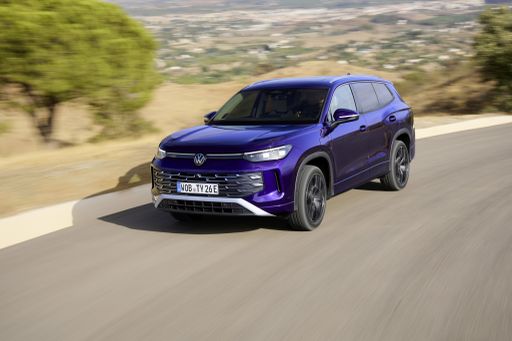 @ Volkswagen AG / VW Media
@ Volkswagen AG / VW Media
VW Tayron
Mazda CX-80
The Mazda CX-80 exemplifies a perfect blend of sophisticated design and dynamic performance, making it a standout model in the SUV market. With its sleek lines and contemporary interior, it delivers a sense of luxury typically reserved for higher-end marques. This model also offers impressive handling and a comfortable ride, ensuring an enjoyable driving experience in various conditions.
details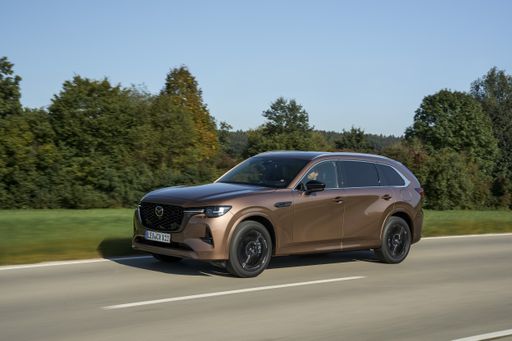 @ Mazda Motor Corporation
@ Mazda Motor Corporation
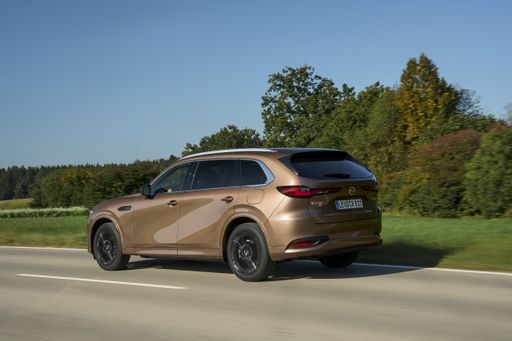 @ Mazda Motor Corporation
@ Mazda Motor Corporation
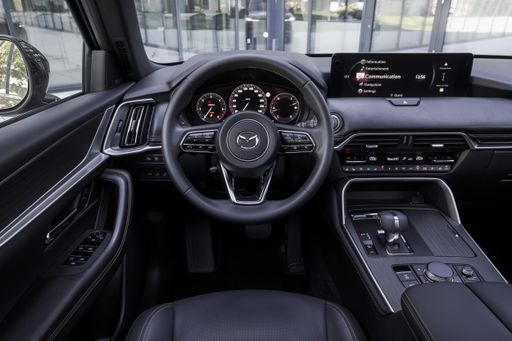 @ Mazda Motor Corporation
@ Mazda Motor Corporation
VW Tayron
The Tayron stands out as a stylish and versatile SUV that expertly blends form and function. With its spacious interior and modern design, it caters to families and adventure seekers alike, making every journey enjoyable. Equipped with advanced technology and safety features, the Tayron promises a driving experience that is both secure and exhilarating.
details @ Volkswagen AG / VW Media
@ Volkswagen AG / VW Media
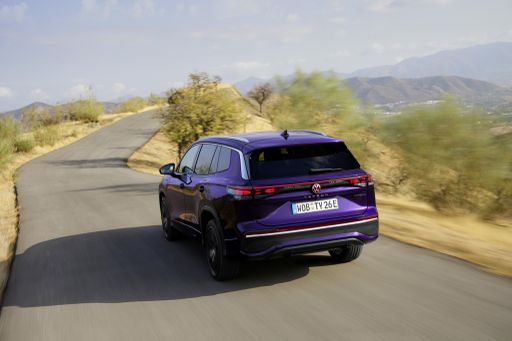 @ Volkswagen AG / VW Media
@ Volkswagen AG / VW Media
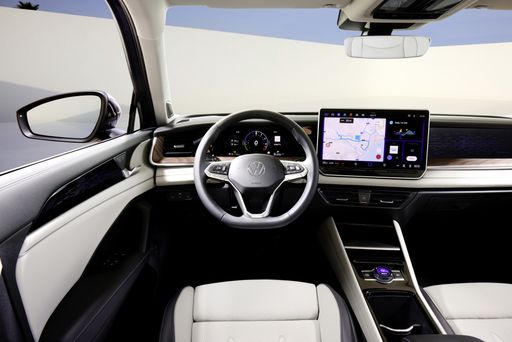 @ Volkswagen AG / VW Media
@ Volkswagen AG / VW Media
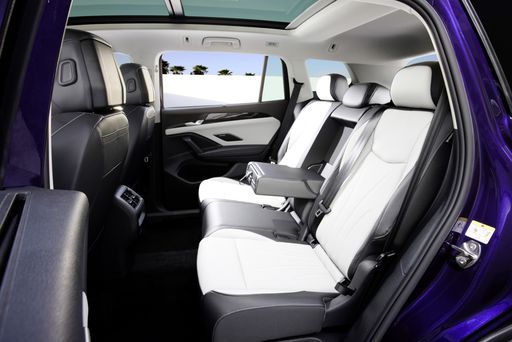 @ Volkswagen AG / VW Media
@ Volkswagen AG / VW Media
 @ Mazda Motor Corporation
@ Mazda Motor Corporation
|
 @ Volkswagen AG / VW Media
@ Volkswagen AG / VW Media
|
|
|
|
Costs and Consumption |
|
|---|---|
|
Price
48200 - 60200 £
|
Price
39000 - 52600 £
|
|
Consumption L/100km
1.6 - 5.8 L
|
Consumption L/100km
0.4 - 8.5 L
|
|
Consumption kWh/100km
-
|
Consumption kWh/100km
-
|
|
Electric Range
61 km
|
Electric Range
117 - 126 km
|
|
Battery Capacity
-
|
Battery Capacity
19.70 kWh
|
|
co2
35 - 151 g/km
|
co2
9 - 192 g/km
|
|
Fuel tank capacity
70 - 74 L
|
Fuel tank capacity
45 - 58 L
|
Dimensions and Body |
|
|---|---|
|
Body Type
SUV
|
Body Type
SUV
|
|
Seats
7
|
Seats
5
|
|
Doors
5
|
Doors
5
|
|
Curb weight
2131 - 2240 kg
|
Curb weight
1682 - 1948 kg
|
|
Trunk capacity
258 L
|
Trunk capacity
705 - 885 L
|
|
Length
4995 mm
|
Length
4792 mm
|
|
Width
1890 mm
|
Width
1853 - 1866 mm
|
|
Height
1714 mm
|
Height
1666 - 1668 mm
|
|
Max trunk capacity
1971 L
|
Max trunk capacity
1915 - 2090 L
|
|
Payload
649 - 650 kg
|
Payload
489 - 566 kg
|
Engine and Performance |
|
|---|---|
|
Engine Type
Plugin Hybrid, Diesel MHEV
|
Engine Type
Petrol MHEV, Plugin Hybrid, Diesel, Petrol
|
|
Transmission
Automatic
|
Transmission
Automatic
|
|
Transmission Detail
Automatic Gearbox
|
Transmission Detail
Dual-Clutch Automatic
|
|
Drive Type
All-Wheel Drive
|
Drive Type
Front-Wheel Drive, All-Wheel Drive
|
|
Power HP
254 - 327 HP
|
Power HP
150 - 272 HP
|
|
Acceleration 0-100km/h
6.8 - 8.4 s
|
Acceleration 0-100km/h
6.1 - 9.7 s
|
|
Max Speed
195 - 219 km/h
|
Max Speed
204 - 240 km/h
|
|
Torque
500 - 550 Nm
|
Torque
250 - 400 Nm
|
|
Number of Cylinders
4 - 6
|
Number of Cylinders
4
|
|
Power kW
187 - 241 kW
|
Power kW
110 - 200 kW
|
|
Engine capacity
2488 - 3283 cm3
|
Engine capacity
1498 - 1984 cm3
|
General |
|
|---|---|
|
Model Year
2024
|
Model Year
2025
|
|
CO2 Efficiency Class
B, E
|
CO2 Efficiency Class
E, B, F, G
|
|
Brand
Mazda
|
Brand
VW
|
What drive types are available for the Mazda CX-80?
The Mazda CX-80 is offered with All-Wheel Drive.
The prices and data displayed are estimates based on German list prices and may vary by country. This information is not legally binding.
